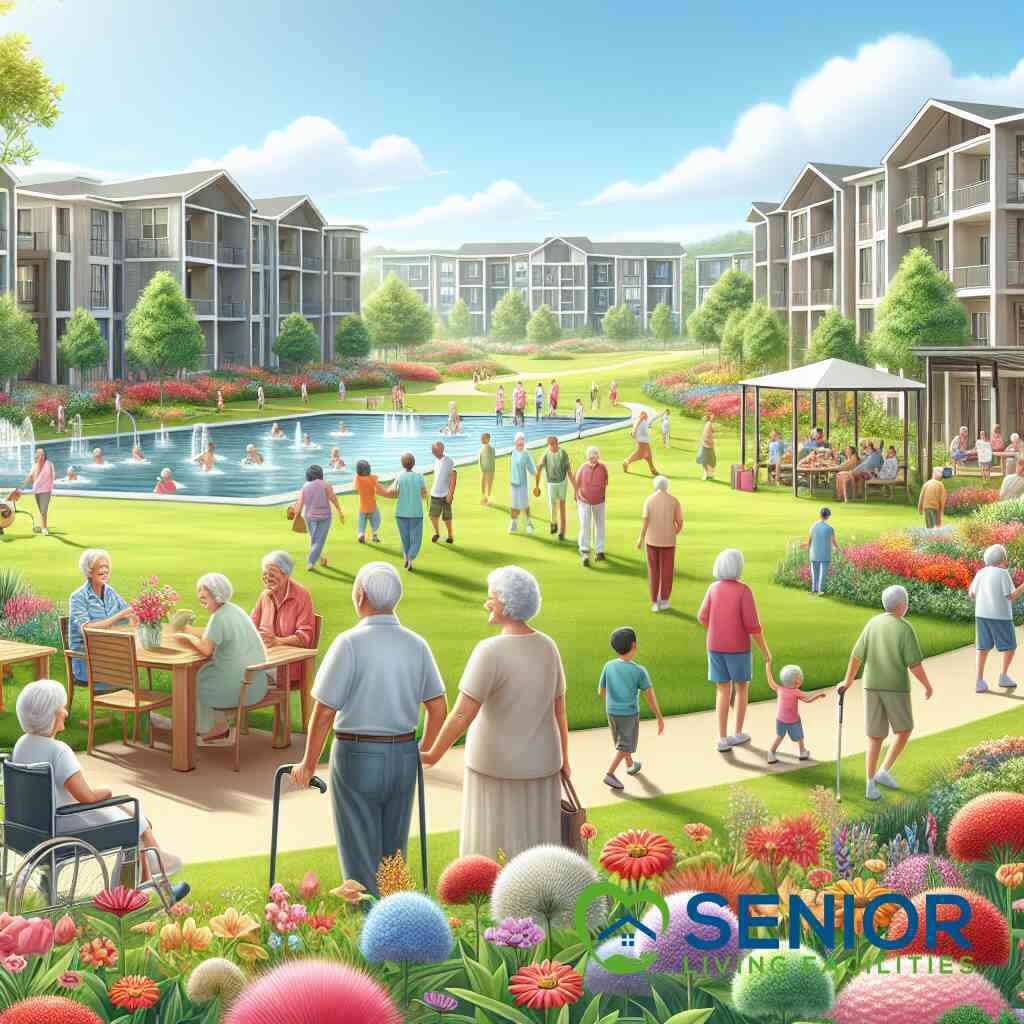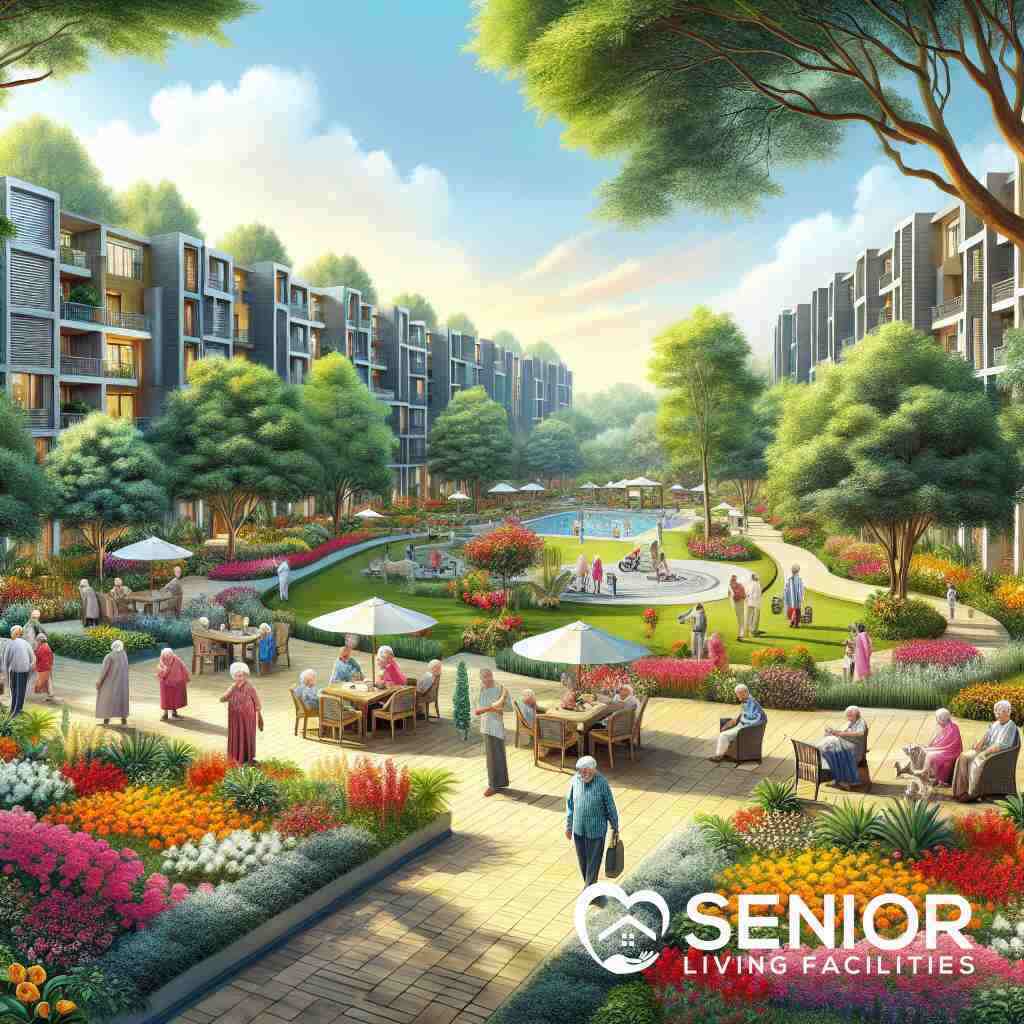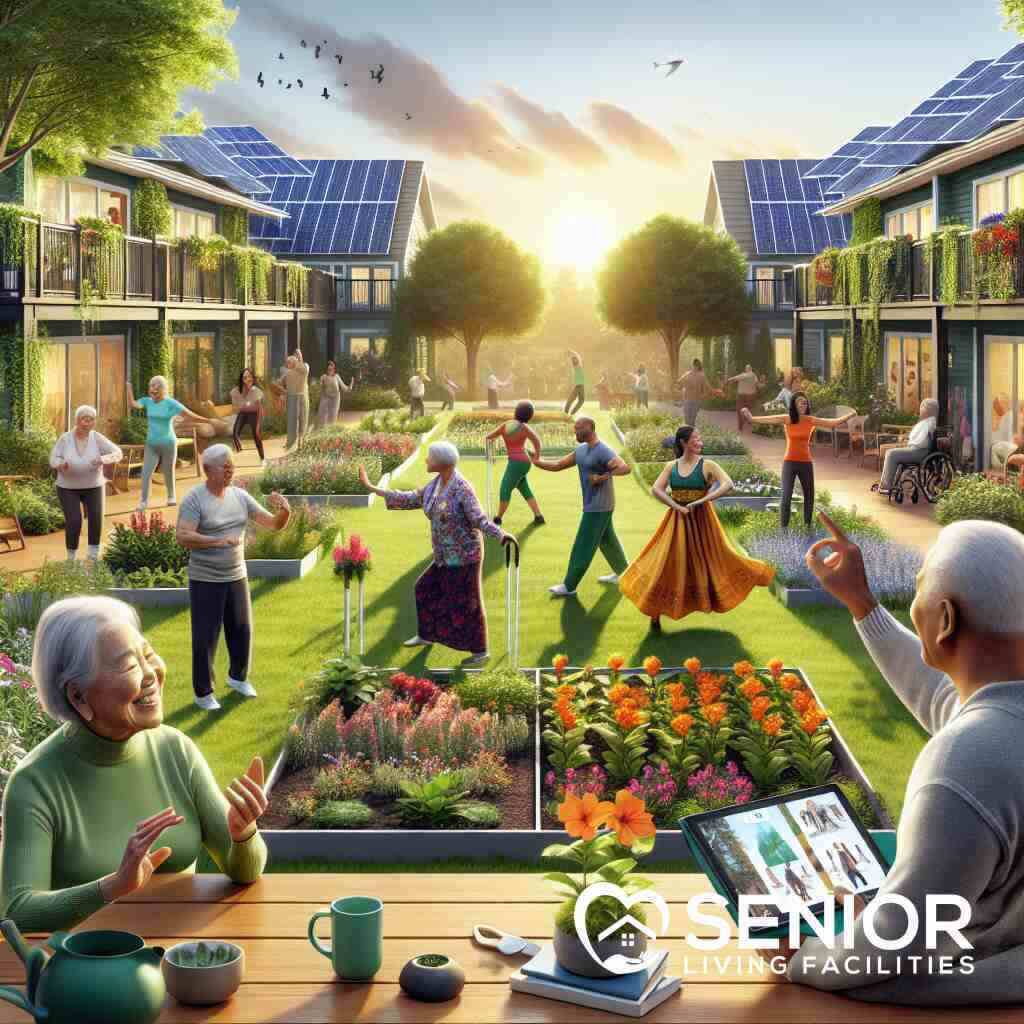
What is the Definition of Independent Living?
August 8, 2024
Introduction to Independent Senior Living
Understanding the Concept
Independent living for seniors embodies the essence of freedom, offering individuals aged 55 and above the opportunity to live life on their terms. It’s a lifestyle choice that emphasizes self-sufficiency, privacy, and autonomy while still providing the safety net of community support when needed. Independent living communities cater to active seniors who do not require round-the-clock care but benefit from a community setting that provides social activities, maintenance services, and sometimes meal plans and transportation. This concept is vital for those who wish to enjoy their retirement years without the burdens of home maintenance and who value the companionship of like-minded individuals.
The Shift towards Maintenance-Free Living
The appeal of a maintenance-free lifestyle cannot be overstated for today’s seniors. Over the years, there has been a significant shift towards independent senior living, largely due to the desire to be relieved of the daily chores and upkeep associated with traditional homeownership. This transition isn’t just about easing the physical demands on older adults; it’s also about freeing up their time. Time that can be spent traveling, engaging in hobbies, and enjoying family without the worry of property maintenance. Independent living communities are designed to facilitate this smooth transition by offering various housing options, from apartments to cottages, all within a secure and supportive environment.
Why It’s a Popular Choice for Seniors 55+
Independent living has grown increasingly popular among the 55+ demographic for several reasons. First and foremost, it addresses the desire for an active, engaged lifestyle free from the constraints of property upkeep. Additionally, it offers a sense of community that can sometimes be lost in traditional neighborhood settings, especially as people age. Social isolation can be a significant issue for seniors, but independent living communities offer a built-in social network of peers. Activities, social events, and shared dining areas provide daily opportunities for interaction, making it easier for residents to build new friendships and maintain a vibrant social life. The combination of maintaining independence while having access to a supportive community makes independent living a compelling choice for seniors seeking to maximize their golden years.
By choosing this lifestyle, seniors can effectively balance their desire for autonomy with the availability of supportive services and amenities that enhance their quality of life. The model of independent living strikes a perfect chord for those seeking to enjoy retirement to the fullest, making it a cornerstone of modern senior living strategies.
The Spectrum of Senior Living Options
Independent Living vs Assisted Living
When exploring the landscape of senior living, understanding the distinction between independent senior living and assisted living is crucial. Independent living is designed for seniors who are able to live on their own with minimal assistance but wish to benefit from a community environment that offers social activities, maintenance services, and perhaps meal plans. On the other hand, assisted living provides more personalized care, including help with activities of daily living (ADLs), medication management, and more hands-on support.
The choice between independent living and assisted living hinges on the individual’s needs for daily assistance and the level of independence they can or wish to maintain. For those who value their autonomy yet appreciate the convenience of community living, independent living offers the ideal balance. Meanwhile, assisted living is tailored for individuals who require a greater degree of care while still fostering a sense of independence within a supportive community setting.
Navigating Housing Options for Seniors
Deciding on the right senior living option can feel overwhelming given the breadth of available choices, each catering to different needs, preferences, and lifestyles. Ultimate Guide to Senior Living in New York 2024 From age-restricted communities designed for active seniors to upscale retirement communities boasting a full spectrum of amenities and services, the options are vast. Key considerations in navigating these options include evaluating the level of care needed, lifestyle preferences, location, and, importantly, budget.
For seniors leaning towards independent living or those exploring a transition to more supportive living arrangements, it’s important to research and visit potential communities thoroughly. This process helps in understanding the unique offerings of each and determining which environment will best support the senior’s desired lifestyle and care needs. Compiling a list of must-have features and services can streamline this process, aligning choices more closely with individual needs and expectations.
Senior Apartment Rentals and Their Appeal
Senior apartment rentals are a popular option for those seeking the convenience and community aspect of independent living without the commitment of homeownership. These rentals often come with tailored amenities such as fitness centers, communal dining areas, and planned social activities, enhancing the residents’ lifestyle and facilitating social connections.
The appeal of senior apartment rentals lies not just in the maintenance-free living they offer but also in their flexibility. Unlike purchasing a property within a retirement community, renting allows seniors to adjust their living arrangements as their needs change without the burden of selling a home. This flexibility, combined with the opportunity to live among peers in a community-oriented environment, makes senior apartment rentals an attractive option for many seeking independent yet connected senior living solutions.
Benefits of Choosing Independent Living
Fostering Self-Sufficiency in Seniors
The ethos of independent senior living revolves around nurturing an environment where seniors are encouraged to maintain and express their independence. This aligns perfectly with the broader definition of independent living, which focuses on empowering individuals to make choices about their daily lives. Independent living communities create a scaffold that supports seniors in managing their own lives to the greatest extent possible, from choosing their housing to deciding how they spend their days. This empowerment contributes significantly to their sense of dignity, self-worth, and happiness.
These communities are carefully designed to remove barriers that may impede self-sufficiency. For example, homes are often equipped with safety features and are designed to be accessible, ensuring that as seniors age, their environment doesn’t become a hindrance to their independence. Moreover, by offering a plethora of services, from maintenance to transportation, these communities ensure that seniors can focus on living a fulfilling life, pursuing their interests, and engaging in lifelong learning without the burdens of traditional homeownership.
Amenities That Enhance Senior Lifestyles
A key attraction of independent living communities is the array of amenities designed to enhance seniors’ lifestyles. These amenities, which range from fitness centers to clubhouses, libraries, swimming pools, and even on-site theaters, are not just perks but essential components that promote active, healthy living among seniors. Independent living communities recognize the importance of physical activity and social engagement in maintaining one’s health and well-being. Therefore, everything about these communities is tailored to facilitate an active lifestyle.
For seniors, having ready access to such amenities can make a significant difference in their daily lives. It provides them with opportunities to stay fit, learn new skills, and socialize, all within a safe and accessible environment. Moreover, these amenities often extend to include wellness programs, educational workshops, and cultural outings, ensuring that residents have a well-rounded lifestyle that supports both their mental and physical health.
The Role of Social Connections in Senior Communities
Independent living communities play a pivotal role in fostering social connections among seniors. As individuals age, they might find it challenging to maintain an active social life due to various reasons such as mobility issues, the passing of peers, or even geographical distance from family. Independent living facilities address this issue head-on by creating environments that encourage interaction and engagement among residents.
Communities are designed with shared spaces such as dining halls, gardens, and lounges, which serve as natural gathering spots for residents to meet and form friendships. Beyond the physical layout, a robust calendar of social events, group activities, and clubs ensures that residents have plenty of opportunities to connect over shared interests. This focus on social connectivity is crucial as it combats loneliness and promotes a sense of belonging and community among seniors.
The impact of such connections cannot be understated. Studies have shown that strong social ties can improve one’s lifespan and significantly enhance the quality of life. In this respect, independent living communities offer more than just housing; they provide a vibrant social framework that enriches the lives of seniors, making them a compelling choice for those looking to enjoy their retirement years to the fullest.
By choosing an independent living community, seniors are not just selecting a place to live; they are opting into a lifestyle that values independence, community, and wellness. These benefits highlight why independent living is such an appealing option for those seeking to make the most of their senior years.
Cost Considerations for Independent Living Facilities
Understanding Senior Independent Living Costs
When considering the transition to an independent living facility, comprehending the associated costs is fundamental. Independent living, designed for seniors seeking a maintenance-free lifestyle with amenities at their fingertips, often involves a variety of expenses. These can range from monthly rent or fees that cover housing, utilities, maintenance, and possibly meal plans and recreational activities. Unlike traditional housing, these communities offer tailored services aimed at enhancing seniors’ quality of life, which is factored into the overall cost. Importantly, costs can fluctuate significantly based on location, the type of housing chosen, and the extent of amenities and services provided. To navigate these options efficiently, it’s crucial to assess what services are essential for your lifestyle and which ones you can forego, as this will directly impact your budget.
Comparing Costs: Independent Living vs Long-Term Care Facilities
When exploring senior living options, it’s vital to compare the costs of independent living against those of long-term care facilities. Independent living communities are generally more cost-effective for seniors who do not yet require extensive medical care or assistance with activities of daily living. These communities focus on convenience, offering a mix of social activities, housekeeping, and meal services without the higher level of care provided in nursing homes or assisted living facilities. On the other side, long-term care facilities are designed for individuals who need regular medical attention or help with daily tasks, which typically results in higher costs due to the specialized care and staffing required. Making a clear distinction between these options based on current and anticipated future needs can help in making a financially sound decision that aligns with both lifestyle preferences and care requirements.
Financial Planning for Retirement Communities
Effectively planning for the financial impact of moving into a retirement community is a critical step toward a stress-free retirement. This process begins with a thorough assessment of one’s financial resources, including savings, investments, retirement accounts, and any potential income sources like pensions or Social Security benefits. Additionally, exploring financing options such as long-term care insurance, reverse mortgages, or veterans’ benefits can provide extra support in covering the costs. Engaging with a financial advisor who specializes in senior living can offer personalized guidance, helping to navigate the complexities of retirement planning. They can assist in identifying suitable senior living facilities that align with financial capabilities and lifestyle expectations. Preparing a detailed budget that accounts for the initial move-in expenses along with ongoing monthly costs ensures that seniors can enjoy their golden years in comfort and security, surrounded by a supportive community tailored to their interests and needs.
How to Choose an Independent Living Community
Evaluating Amenities in Independent Living
When you embark on the journey of finding an independent living community, one of the first aspects you’ll want to consider is the range of amenities offered. Amenities are crucial because they directly impact your quality of life and daily convenience. In independent living communities, amenities can vary widely but often include features like fitness centers, swimming pools, on-site restaurants or dining programs, libraries, and activity rooms.
To evaluate amenities effectively, it’s essential to consider your current lifestyle and interests. Are you someone who enjoys regular exercise or swimming? Then, communities with well-equipped fitness centers and pools might be more appealing. Do you love reading or engaging in creative projects? Look for communities that offer a library, arts and crafts rooms, or workshops. Remember, the goal of independent living is to enhance your lifestyle and provide opportunities for engagement and activity, so prioritize communities that align with your interests.
Another key factor is the availability of on-site healthcare services or wellness programs. While independent living does not offer the same level of care as assisted living, some communities have partnerships with healthcare providers to offer routine health checks, fitness programs tailored to seniors, or even on-site medical services. Exploring these amenities can provide peace of mind about your future health needs. For more insights, consider exploring the Senior Living Blog for real-life examples and advice on what amenities to look for.
Safety Features in Independent Living Communities
The safety and security features of an independent living community are paramount. When touring potential communities or researching options, pay close attention to the safety measures in place. Key safety features might include 24-hour security personnel, emergency call systems in each residence, well-lit pathways and common areas, secure entrances, and assistance available with the press of a button.
Another aspect of safety is the community’s design and architecture. Are the facilities easily navigable for individuals with mobility issues? Are there grab bars in the bathrooms, and do the buildings comply with ADA (Americans with Disabilities Act) standards? These features not only contribute to a safer living environment but also ensure that you can maintain a high level of independence as you age.
In addition, inquire about the community’s protocols in case of medical emergencies or natural disasters. Understanding how a community responds to emergencies can provide crucial insight into their commitment to resident safety.
Location and Lifestyle: Finding the Right Fit
The location of an independent living community plays a significant role in your daily life and can greatly affect your overall happiness. When considering different locations, think about proximity to loved ones, climate preferences, and access to external amenities such as shopping, dining, cultural attractions, and healthcare facilities. Living near family and friends can make visits easier and contribute to a stronger support network. Meanwhile, easy access to external amenities can enhance your lifestyle, offering varied opportunities for entertainment and social engagement.
However, location isn’t just about logistics; it’s also about lifestyle. Some seniors prefer the quieter, more relaxed pace of suburban or rural communities, while others thrive in the vibrancy of urban settings. Assess what type of environment makes you feel most at home and energized. Furthermore, consider whether the community aligns with your lifestyle preferences. Does it offer outdoor spaces for walks or gardening? Are there clubs or groups that match your hobbies or interests?
Choosing the right independent living community involves a balance of practical considerations and personal preferences. Consider reaching out via the Contact Senior Living Facilities page for personalized guidance tailored to your specific needs and preferences. This can make the search process more manageable and ensure that you find a community where you can live your best, most fulfilling life.
Activities and Lifestyle in Independent Communities
Encouraging Active Senior Living
Independent living communities are not just about providing a place to live; they’re about enhancing the overall lifestyle of seniors. Encouraging active senior living is a cornerstone of these communities, offering fitness centers, yoga classes, swimming pools, and walking trails. These amenities are designed to cater to the physical well-being of residents, promoting health and longevity. Moreover, many communities organize group activities such as golf, tennis, and dancing, making fitness a social and enjoyable part of every day. The aim is to create an environment where seniors feel motivated and supported in maintaining an active lifestyle, recognizing that staying physically fit is crucial for both mental and physical health. Engaging in regular physical activity can lead to a more energized and fulfilling retirement life, something that Senior Living Facilities staunchly promotes through their extensive listing of communities that prioritize active lifestyles.
Independent Living Meal Plans and Dietary Concerns
A significant benefit of independent living communities is the attention given to meal plans and dietary concerns, ensuring that residents not only enjoy delicious meals but that their nutritional needs are met as well. Many communities offer flexible meal plans that cater to various dietary requirements, including vegetarian, low-sodium, or diabetic-friendly options. The dining services are often akin to restaurant-style dining, with professional chefs preparing a wide range of healthy and delicious dishes. This focus on nutrition and choice ensures that seniors have access to meals that not only contribute to their health but also to their enjoyment of life. Dining in a communal setting also adds a social dimension to meal times, turning dining into an event that residents can look forward to each day. As highlighted in the Ultimate Guide to Senior Housing in Texas 2024, many modern senior living communities are placing an increased emphasis on providing diverse and nutritionally balanced meal options.
Cultural and Recreational Activities for Seniors
Independent living communities offer an impressive array of cultural and recreational activities designed to enrich the lives of seniors. From art classes and music workshops to book clubs and guest lectures, these activities cater to a wide range of interests and hobbies, encouraging lifelong learning and creativity. Additionally, many communities arrange outings to local museums, theaters, concerts, and other cultural events, providing residents with opportunities to engage with the broader community and experience new and exciting activities.
Participation in these cultural and recreational programs not only invigorates the mind but also fosters a sense of belonging and community among residents. It’s an aspect of independent living that allows seniors to explore new interests or rekindle old passions in a supportive and stimulating environment. Highlighting the importance of such activities, the Top 5 Wellness Programs in Texas Senior Facilities demonstrates how embracing a wide range of recreational and cultural pursuits can significantly enhance the quality of life for seniors, making every day an opportunity for growth and enjoyment.
The vibrant lifestyle offered by independent living communities goes beyond simply providing care; it’s about creating a rich, fulfilling environment that respects and celebrates each senior’s individuality and capabilities.
The Future of Independent Living for Seniors
Technological Advances in Senior Care
The landscape of senior living is rapidly evolving, with technology playing a pivotal role in reshaping care and support for older adults. In independent living communities, cutting-edge technological solutions are being integrated to enhance the safety, comfort, and overall quality of life for residents. From smart home devices that allow seniors to control lighting, temperature, and security features with voice commands or smartphone apps to wearable health monitors that track vital signs and alert medical staff to potential issues, technology is making independent living safer and more appealing than ever.
Telehealth has also become an indispensable tool, providing residents with immediate access to healthcare professionals, thereby reducing the need for hospital visits and enabling prompt medical attention. Additionally, virtual reality programs offer immersive experiences for entertainment, social connection, and even cognitive therapy, helping seniors to stay mentally active and engaged. As technology continues to advance, independent living communities are set to become even more accommodating, empowering seniors to lead fulfilling lives with an optimal level of autonomy.
Sustainable Practices in Retirement Communities
As environmental awareness grows, so does the commitment of retirement community developers and operators to sustainable practices. Modern independent living communities are adopting green building standards, energy-efficient appliances, and systems designed to minimize waste and conserve resources. These initiatives not only contribute to protecting the planet but also create healthier living spaces for residents, with improved air quality and natural light, which can enhance mood and overall well-being.
Additionally, many communities are incorporating green spaces such as gardens, walking trails, and parks, encouraging outdoor activities and a connection with nature. Some have even embraced urban farming, offering residents the opportunity to grow their vegetables and herbs, which fosters a sense of community and self-sufficiency. Sustainable practices in retirement communities align with the growing desire among seniors to live in environments that are not only comfortable and supportive but also responsible and forward-thinking.
Evolving Expectations for Senior Independent Living Apartments
As the baby boomer generation enters retirement, the expectations for senior independent living apartments are evolving. Today’s seniors are seeking more than just a safe and maintenance-free place to live; they desire vibrant communities that offer a rich array of amenities, social opportunities, and lifestyle options. In response, independent living communities are diversifying their offerings to include upscale dining experiences, state-of-the-art fitness centers, lifelong learning classes, and cultural outings.
Moreover, the design of living spaces is changing to meet the demands for both luxury and functionality. Ultimate Guide to Senior Housing in California 2024 New developments feature modern, spacious apartments with upscale finishes and adaptable designs that can accommodate future needs. With an eye on the future, some communities are also offering smart flats equipped with the latest technologies to enhance convenience and safety for residents.
The Senior Living Facilities in California demonstrate how these evolving expectations are being met. Communities designed to offer a blend of independence, comfort, and luxury are setting a new standard for senior living.
As we look to the future, technological innovation, sustainability, and evolving expectations will continue to redefine independent living for seniors will continue to redefine independent living for seniors. These advancements promise to make independent living even more attractive for seniors, offering them a lifestyle that is not only convenient and carefree but also rich, fulfilling, and aligned with contemporary values.
Conclusion: Embracing Independence in Senior Years
Making Informed Choices
Embracing independence in one’s senior years is a journey that involves making informed and personal choices. As we have explored throughout this discussion on independent living, the focus is on providing seniors with the autonomy to make decisions about their daily lives, from the choice of living environment to how they wish to engage with their community and pursue their interests. This autonomy is a cornerstone of a fulfilling retirement, allowing individuals to shape their lives in ways that align with their desires, needs, and aspirations.
Choosing an independent living community is a significant decision that can greatly enhance the quality of life for seniors. It is important to evaluate the options carefully, considering the quality of amenities, the level of care available, and, importantly, the sense of community offered. Independent living isn’t just about the practical aspects of safety and convenience; it’s about finding a place that feels like home, where one can lead a vibrant, active life among peers.
The Importance of Community in Older Age
The role of community becomes increasingly significant as one enters the golden years. Independent living communities are not just housing solutions; they are vibrant, active centers of social engagement and support. They offer a built-in social network, a plethora of activities, and shared spaces that foster connections. These social frameworks combat loneliness, a common concern among seniors, by promoting a culture of participation and belonging.
A strong sense of community enriches the lives of seniors, providing emotional support and encouraging active participation in a range of activities. This combination of independence and communal support makes independent living such a valuable option for many seniors, offering a balance that supports both their freedom and their need for social interaction.
Looking Ahead: The Aging Population and Independent Living Trends
As we look toward the future, the landscape of senior living is set to evolve further in response to the needs and numbers of the aging population. Technological advancements and a growing emphasis on sustainable living practices are shaping the development of senior communities. These trends aim to enhance not only the convenience and safety of independent living but also its sustainability and accessibility.
With the population of older adults increasing, there is a clear demand for housing options that cater to a diverse spectrum of needs and preferences. Future trends in independent living will likely focus on even more personalized experiences, with communities offering a broader range of services, amenities, and lifestyle choices. This evolution will continue to redefine what it means to live independently in one’s senior years, emphasizing a lifestyle that is both enriching and empowering.
By embracing the principles of independence, choice, and community, seniors can look forward to a future where they can live their best lives on their terms. Independent living communities play a crucial role in this vision, presenting an opportunity for seniors to thrive in environments that respect their desire for autonomy while providing the support and social engagement they seek. As we continue to witness advancements in senior living, the emphasis on creating fulfilling, active, and connected lives for seniors will undoubtedly remain at the heart of independent living philosophies.
Frequently Asked Questions
Question: What is the Definition of Independent Living as described in your blog?
Answer: Independent living, as highlighted in our “What is the Definition of Independent Living?” blog, refers to a lifestyle choice for seniors 55 and older who are looking for a blend of autonomy, comfort, and community. It’s designed for active adults who can manage their day-to-day lives without the need for round-the-clock care but appreciate the convenience of maintenance-free living. At Senior Living Facilities, we emphasize independent living as a gateway to enjoying retirement with peace of mind, offering a variety of communities that support self-sufficient senior living with amenities, social activities, and safety features tailored to enhance the senior lifestyle.
Question: How do independent living costs compare to those of assisted living or long-term care facilities?
Answer: Independent living costs are generally more economical for seniors who do not require extensive medical care or assistance with activities of daily living. These communities focus on providing a fulfilling lifestyle with amenities like social activities, housekeeping, and meal services. In contrast, assisted living and long-term care facilities offer higher levels of care, including medical assistance and help with daily tasks, which can significantly increase costs. At Senior Living Facilities, our advisors work closely with seniors and their families to find the best housing options that meet their budget and care level needs, ensuring a balanced choice between cost and quality of life.
Question: What amenities and services can seniors expect in independent living communities?
Answer: Seniors can look forward to a broad range of amenities and services designed to enhance their lifestyle and well-being in independent living communities. These include fitness centers, swimming pools, communal dining areas, libraries, and a host of social activities and clubs. Our senior living facilities also offer various services such as maintenance and housekeeping, transportation options, and meal plans with dietary considerations. These amenities and services are meticulously chosen to promote active adult communities where seniors can enjoy a vibrant, healthy, and fulfilling retirement.
Question: How does Senior Living Facilities assist in choosing the right independent living community?
Answer: At Senior Living Facilities, we provide a comprehensive platform where seniors and their families can search, compare, and connect with various independent living communities. Our process starts with understanding the senior’s lifestyle preferences, care needs, and budget. From there, we utilize our expansive database of senior living communities to recommend options that align with the individual’s desires for retirement living. Our team offers personalized guidance every step of the way, ensuring families make an informed decision that will best support their loved one’s independence and quality of life.
Question: Can Senior Living Facilities help find independent living communities across all 50 states?
Answer: Absolutely. Senior Living Facilities operates nationwide, offering a vast selection of senior independent living apartments, 55+ living communities, and upscale retirement communities across all 50 US states. Whether you’re looking for a vibrant community in a bustling urban center or a tranquil setting in a more rural locale, our platform and experienced advisors are here to help you find the perfect match. Just begin by entering your location on our website to explore the senior living facilities near you and connect with options that meet your specific needs and preferences.




